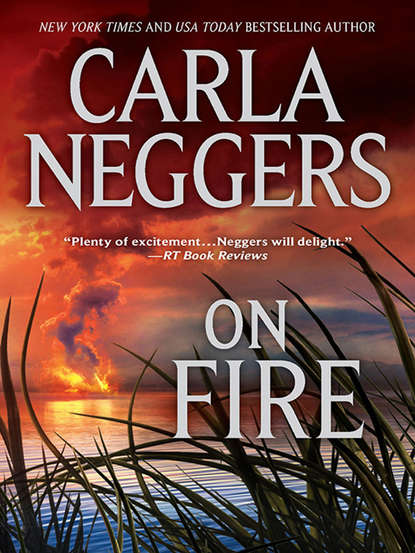По всем вопросам обращайтесь на: info@litportal.ru
(©) 2003-2024.
✖
On Fire
Автор
Год написания книги
2018
Настройки чтения
Размер шрифта
Высота строк
Поля
She grabbed his thin arm. He was seventy-five, wiry and fit, and he had to know what was happening. He knew his ship better than anyone. He stared at the watertight door that had shut fast against the fire and flooding, sealing them in the bowels of the ship. “Emile, we have to take the submersible,” she shouted. “We don’t have any choice.”
“I’m not going anywhere. The pumps will handle the flooding. The crew will put the fire out.”
“The pumps won’t do anything, and if the crew’s smart, they’re getting into the life rafts now. Emile, the Encounter’s sinking. If we stay here, we’ll go down with it.”
He tore his arm from her grip. His dark eyes were wild, his lined, leathery face and white hair all part of the legend that was Emile Labreque. He took a deep breath. “You go. Take the submersible. Get out.”
“Not without you.”
“I need to see to the crew.”
“You can’t. Even if you could get the doors open, the fire’s too intense. And if you didn’t fry to a crisp, you’d drown. Sam will have to see to the crew.” Sam Cassain was the ship’s captain, but Emile would consider the Encounter and her crew his own responsibility. Riley struggled to stay on her feet. Rats. We’re trapped like rats. She fought off panic. “Emile—damn it, you know I’m right.”
He knew. He knew better than she that the Encounter was lost. An engine explosion, a spreading fire, a hull breach—they had only minutes. “The submersible’s only built for one,” he said.
“It’ll handle two. Sam would have sent out an SOS by now. The Coast Guard’s probably already on their way. They’ll pick us up before we run out of air.”
“We’ll have three, maybe four hours at most.”
“It’ll be enough.”
Emile placed a palm on the watertight door, shut his eyes a moment. The Encounter was as famous as he was, the base for his oceanographic research, the documentaries he’d taped, the books he’d written. Now, its day was done.
He turned to her. “We’re out of time. Let’s go.”
Five hours later, Riley numbly accepted a blanket from a Coast Guard crewman and wrapped it around herself. The crewman was saying something, but she couldn’t make out his words. She’d stopped shaking. Her eyelids were heavy, her heart rate steady. But her hands were clammy and very white, and she simply couldn’t make out what he was trying to tell her.
I must be in shock.
Her throat burned and ached from tension and fatigue, from gasping for air as oxygen slowly ran out in the tiny, cramped submersible she and Emile had shared for almost four endless hours.
“My grandfather.” She didn’t know if her words came out. “How is he?”
The crewman frowned as if she’d made no sense.
“Emile—my grandfather.”
“We’re going to get you some help, okay?” The crewman touched her arm through the blanket. “Just hold on.”
“I’m not hurt.” She felt as if she were shouting, but couldn’t hear her own words. “The crew—are they all right? They made it to the lifeboats?”
“Miss St. Joe—”
Something in his face, his tone, sent a stab of dread straight through her. Oh God. “How many? How many died?”
The eyes of the nearby crew turned toward her, and she realized she must have shouted this time. The crewman winced. He was Coast Guard all the way. Every death at sea pained him. He said nothing, and Riley knew. There had been deaths aboard the Encounter. Not everyone had made it off alive.
A man yelled, and she looked up and saw three crewmen holding back Sam Cassain. He was tall and tawny-haired, a thickly built man, a firebrand, a good captain with a propensity for mouthing off. He would speak first, think later.
Riley saw her crewman grimace, as if he wanted to protect her from Sam’s words. Too late. She could make them out clearly.
“Five died,” Sam yelled. “Five. And it’s your goddamned grandfather’s fault. The great Emile Labreque. He’s responsible. He knows it.”
“Who?” Riley clenched the blanket tightly around her, her fingers rigid, her stomach lurching. “Who died? Sam, for God’s sake—”
He couldn’t have heard her, but he shouted, “Bennett Granger’s dead. He fried in the fire. He never had a chance to make it to the lifeboats. Think Emile should be the one to tell your sister, your brother-in-law?”
Riley couldn’t speak. Bile rose in her throat. Bennett Granger was the chief benefactor and cofounder of the Boston Center for Oceanographic Research. He and her grandfather had been friends for fifty years. His son had married Emile’s granddaughter, Riley’s sister. God. Who would tell Matthew and Sig?
“Get him out of here,” her crewman shouted.
“You mark my words, Riley St. Joe,” Sam said, his voice deadly. “I warned Emile. I told him the Encounter was an old girl and we needed to take more precautions. He wouldn’t listen. His mission always came first. Now five people are dead. That’s on his shoulders, not mine.”
Riley struggled to get to her feet. The crewman held her by the elbow, keeping her from going after Sam—or from passing out. “Don’t,” he said softly. “There’ll be an investigation. This will all sort itself out in due time.”
“But Emile—my grandfather—”
“He’s in the infirmary. He’ll be okay.”
Every part of her, mind and body, was spent. She couldn’t even lick her parched lips. “The fire was an accident. It wasn’t Emile’s fault. It wasn’t anybody’s fault.”
The crewman made no response, but his eyes told her everything. He agreed with Sam Cassain. He believed Emile Labreque was responsible for the explosion and the fire that sank the Encounter and killed five people.
Riley clutched the folds of her blanket. Bennett. Oh, God. She wished she could start the day over and save the Encounter, save Bennett, save the crew. But the old ship was gone, and five people were dead, and Emile…her grandfather, she thought, was doomed.
One
R iley ignored the slight tremble in her hands and jammed the two ends of her high-performance paddle together. She zipped up her life vest. There was no reason to be nervous. She’d kayaked the coves and inlets of Schoodic Peninsula since she was six years old. Today’s conditions were near perfect: a bright, clear, still September morning, halfway between low tide and high tide.
She squinted at her grandfather, who’d come down from his cottage to the short stretch of gravelly beach to see her off. “Come with me,” she said.
He shook his head. “You go on. You need to get back out on the water.”
“I’ve been out on the water. Caroline Granger had us onto her yacht for a cocktail party Friday night.”
“Cocktails.” Emile snorted. “That’s not getting out on the water.”
She knew what he meant. She hadn’t been on a boat, a ship, even a kayak, since the Encounter disaster a year ago. On the Granger yacht off Mount Desert Island Friday night, she couldn’t make herself go below. She’d never been claustrophobic, not until the watertight doors had shut her and Emile into the diving compartment, not until the two of them had endured the hot, cramped, terrifying hours in the experimental submersible.
This had to end, she told herself. She was a scientist, director of marine and aquatic animal recovery and rehabilitation at the Boston Center for Oceanographic Research. She couldn’t get spooked about the water.
“I shouldn’t kayak without a partner.”
Emile shrugged. “You’ll stay close to shore. Just watch out for fog rolling in later.”
“You’re sure you won’t come with me?” she asked him.
“I can kayak anytime I want.”











